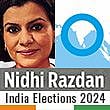BJP intensifies outreach to India’s minorities
While the aim cannot be faulted, ruling party must be genuinely ready to change course


As part of it’s strategy to win the next Lok Sabha polls in 2024, the Bharatiya Janata Party (BJP) has decided to reach out to those communities that traditionally have not voted for it. And om top of that list are minorities and the marginalised.
The party has identified 60 Lok Sabha constituencies in 10 states and a Union Territory, where minorities comprise more than 30 per cent of the population. It is here that they plan to do an outreach programme, spanning over four months.
This is expected to begin from March or April with the aim of sending a message that the Prime Minister’s welfare programmes are for all citizens. Around 5,000 people are being identified from all the constituencies to take this message to the grass roots.
They will interact with leading members of the minority community like businessmen, religious leaders and others. It is expected that the Prime Minister will address a rally in May once the initiative ends.
Confidence building measure
This outreach to minorities comes weeks after Prime Minister Modi told the BJP national executive that party workers must reach out to Pasmanda Muslims (socially backward-class Muslims), Bohras, Muslim professionals and educated Muslims, without expecting votes in return, and build their confidence.
‘The Indian Express’ reported a detailed break up of the Lok Sabha seats which have been identified by the BJP for this programme. This includes Rahul Gandhi’s constituency of Wayanad in Kerala, where 57% of the population comprises of minorities.
There are 13 seats each from UP and Bengal, all 5 from Jammu and Kashmir, four from Bihar, six each from Kerala and Assam, three from Madhya Pradesh, two each from Telangana and Haryana, and one each from Maharashtra and Lakshadweep.
All these seats have a significant minority population, some like Kishanganj in Bihar as high as 67%.
In UP, the BJP won the Muslim dominated seat of Rampur in an assembly by election in December for the very first time, largely because the Muslim voter turnout was very poor, but also because upper castes and Other Backwards Castes consolidated behind the party.
Shift among Muslim voters?
This was a seat long held by the Samajwadi Party veteran Azam Khan. BJP leaders claim there was some shift among Muslim voters too due to the popularity of central welfare schemes.
The outreach to Pasmandas was first pushed by the BJP ahead of last year’s UP assembly polls. This social class is essentially Dalit and backward caste who constitute around 85 per cent of the Muslim population and about 10 per cent of India’s population.
While the aim to reach out to minorities cannot be faulted, the party’s hypocrisy needs to be called out. The party does not have a single Muslim legislator in the entire country — no MP and no MLA.
BJP's empty slogans
The lone Muslim minister in the union cabinet, Mukhtar Abbas Naqvi, was dropped last year after his Rajya Sabha term ended.
In the 2014 Lok Sabha polls, the BJP fielded seven Muslim candidates. They all lost. In the next election in 2019, they had six Muslim candidates. They all lost.
BJP leaders openly admit that given the almost zero support from Muslims for the BJP, they woo other voters instead. It is no surprise that this has happened.
The anti-minority rhetoric from BJP affiliates in the sangh parivar — from hate speeches to ‘love jihad’ bogies, there are too many to count.
Any meaningful outreach to Muslims will only happen if the ruling party is genuinely ready to change course. Until then, it will remain an empty slogan.
Sign up for the Daily Briefing
Get the latest news and updates straight to your inbox




